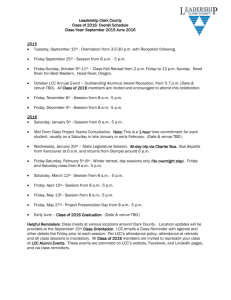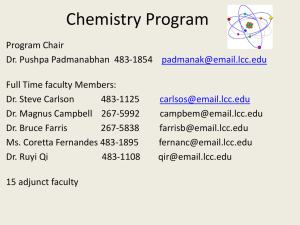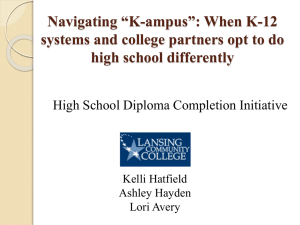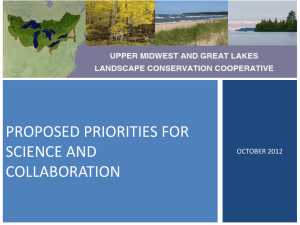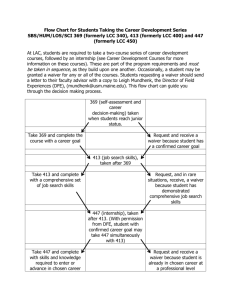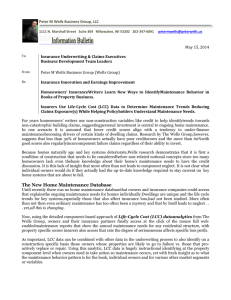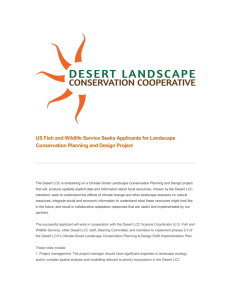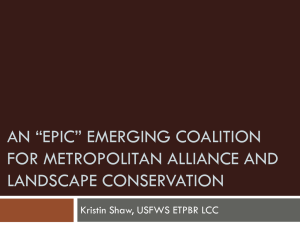LRRK2 Cohort Consortium Publications Policy
advertisement
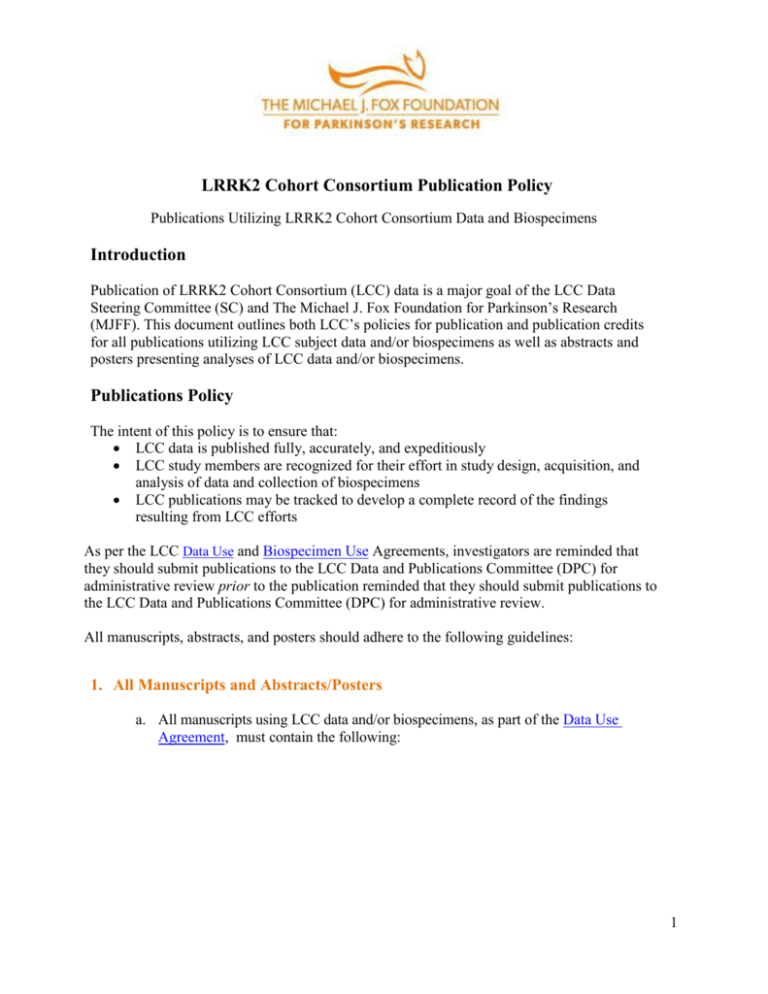
LRRK2 Cohort Consortium Publication Policy Publications Utilizing LRRK2 Cohort Consortium Data and Biospecimens Introduction Publication of LRRK2 Cohort Consortium (LCC) data is a major goal of the LCC Data Steering Committee (SC) and The Michael J. Fox Foundation for Parkinson’s Research (MJFF). This document outlines both LCC’s policies for publication and publication credits for all publications utilizing LCC subject data and/or biospecimens as well as abstracts and posters presenting analyses of LCC data and/or biospecimens. Publications Policy The intent of this policy is to ensure that: LCC data is published fully, accurately, and expeditiously LCC study members are recognized for their effort in study design, acquisition, and analysis of data and collection of biospecimens LCC publications may be tracked to develop a complete record of the findings resulting from LCC efforts As per the LCC Data Use and Biospecimen Use Agreements, investigators are reminded that they should submit publications to the LCC Data and Publications Committee (DPC) for administrative review prior to the publication reminded that they should submit publications to the LCC Data and Publications Committee (DPC) for administrative review. All manuscripts, abstracts, and posters should adhere to the following guidelines: 1. All Manuscripts and Abstracts/Posters a. All manuscripts using LCC data and/or biospecimens, as part of the Data Use Agreement, must contain the following: 1 i. All manuscripts using LCC data will acknowledge the methods of LCC data gathering using the following language recommended by the LCC (see Data Use Agreement): “Data used in preparation of this article were obtained from the MJFF-sponsored LRRK2 Cohort Consortium (LCC). For up-to-date information on the study, visit https://www.michaeljfox.org/page.html?lrrk2-cohort-consortium&navid=lrrk2-cohortconsortium).” ii. All manuscripts using LCC biospecimens will acknowledge the LCC and MJFF using language similar to the following (see Biospecimen Use Agreement): “Biospecimens used in the analyses presented in this article were obtained from the MJFF-sponsored LRRK2 Cohort Consortium (LCC). For up-to-date information on the study, visit https://www.michaeljfox.org/page.html?lrrk2-cohortconsortium&navid=lrrk2-cohort-consortium).” iii. All manuscripts will acknowledge the support of MJFF using language similar to the following (see Data Use Agreement): “The LRRK2 Cohort Consortium is coordinated and funded by The Michael J. Fox Foundation for Parkinson’s Research.” b. All manuscripts and abstracts/posters will be submitted to the DPC for administrative review two weeks prior to submission by emailing the manuscript or abstract/poster to resources@michaeljfox.org with subject “LRRK2 CC Publication”. The purpose of this review will be to make sure that all of the above administrative requirements are met. c. Full citation of all published manuscripts and abstracts/posters will be provided to MJFF and the LCC upon acceptance to a journal or conference by emailing resources@michaeljfox.org. A copy of the manuscript or abstract/poster will be provided to LCC upon publication of the manuscript or presentation of the abstract/poster by emailing resources@michaeljfox.org. If permitted by the journal, a version of the article or link to the article will be available online at the LCC website. 2. Primary Publications LCC Primary Publications are defined as those reports, analyses, and subsequent publications on studies identified by MJFF and the LCC as fulfilling the primary objectives of the study: rationale for LCC and impact on PD differences between idiopathic PD and LRRK2 PD characterization of premotor LRRK2 PD 2 All Primary Publications will be authored by MJFF and LCC investigators. In addition to the requirements for all manuscripts and abstracts/posters detailed in the above Section 1, confirmed Primary Publications should adhere to the following guidelines: a. Primary Manuscripts The author line of the manuscript will report primary and secondary authors (as defined by the writing committee) and no more than two representatives from LRRK2 Cohort Consortium contributing sites. In addition, the LCC will be recognized in the following manner: i. ii. The phrase “and the LRRK2 Cohort Consortium*” will be written on the author line The asterisk following “and the LRRK2 Cohort Consortium” on the author line should refer to the following sentence: “The investigators within the LCC contributed to the design and implementation of the LCC and/or provided data and/or collected biospecimens, but did not necessarily participate in the analysis or writing of this report. LCC investigators include [names of LCC investigators (see Section 4. LCC Investigators) or link to this Publication Policy with reference to Section 4. LCC Investigators section].” b. Primary Abstracts/Posters All confirmed primary abstracts and posters should include the phrase “and the LRRK2 Cohort Consortium” on the author line. 3. Secondary Publications Secondary publications will be written by independent investigators with access to LRRK2 data and /or biospecimens. In addition to the requirements for all manuscripts and abstracts/posters detailed in the above Section 1, Secondary Publications should adhere to the following guidelines: a. Secondary Manuscripts As secondary publications will be authored by independent 3rd party researchers, the LCC will be recognized in the following manner: i. ii. The phrase “and the LRRK2 Cohort Consortium” may not be written on the author line The manuscript must contain an acknowledgement of the LCC members using the following language: “The investigators within the LCC contributed to the design and implementation of 3 the LCC and/or provided data and/or collected biospecimens, but did not necessarily participate in the analysis or writing of this report. LCC investigators include [names of LCC investigators (see Section 4 LCC Investigators) or link to this Publication Policy with reference to Section 4 LCC Investigators section].” b. Secondary Abstracts/Posters All secondary abstracts and posters should not include the phrase “and the LRRK2 Cohort Consortium” on the author line. 4. LCC Investigators If allowed by the journal, the following list of LCC Investigators should appear in its entirety in all publications using LCC data and/or samples according to the guidelines above. If space or the journal does not allow for the printed list to appear, the publication should include a link to this Publication Policy and a reference to its Section 4. LCC Investigators section. Beth Israel Medical Center, New York, NY, USA Naomi Lubarr, MD Rachel Saunders-Pullman, Marta San Luciano, MD, MD, MPH Deborah Raymond, MSc MSc Joan Miravite, NP Andres Deik, MD Christina Palmese, PhD Matthew James Barrett, Rivka Sachdev, MD MD, MSc Harini Sarva, MD Jose Cabassa, MD Lawrence Severt, MD, PhD Mark Groves, MD Vicki Shanker, MD Ann L. Hunt, DO Columbia University Medical Center, New York, NY, USA Lucien Cote, MD, Roy N. Alcalay, MD, MSc Cheryl Waters, MD Ming-X Tang, PhD Pietro Mazzoni, MD, PhD Helen Mejia Santana, MSc Blair Ford, MD Ernest Roos, MD Elan Louis, MD, MSc Martha Orbe-Reilly, MD Oren Levy, MD, PhD Stanley Fahn, MD Hôpital de la Pitié-Salpétrière, Paris, FRANCE Anne-Marie Bonnet, MD Alexis Brice, MD Marie-Laure Welter, MD, Jean-Christophe Corvol, MD, PhD PhD Florence Cormier, MD Valérie Mesnage, MD Matthew Carrington Swan, MD Jeannie Soto-Valencia, BA Brooke Johannes, MSc Robert Ortega, MSc Laurie Ozelius, PhD Susan Bressman, MD Llency Rosado, MD Diana Ruiz, BSc Tsvyatko Dorovski, MSc, MBA Lorraine Clark, PhD Karen S Marder, MD, MPH Marie Vidailhet, MD Emmanuel Roze, MD, PhD Lucette Lacomblez, MD David Grabli, MD, PhD Hospital Donostia, San Sebastian, SPAIN 4 Ana Gorostidi Pagola, PhD Hospital Clinic de Barcelona, Barcelona, SPAIN Ruben Fernandez-Santiago, Eduardo Tolosa, MD Claustre Pont-Sunyer MD PhD Dolores Vilas Rolán MD Maria Quintana, BS Manel Fernandez, BS Laura Maragall, BA National Institute of Neurology Tunis, Tunisia Lefkos Middleton, MD, Faycal Hentati, MD Matthew Farrer, PhD FRCP Rachel Gibson, PhD John Duda, MD Joanne Trinh, BS Matt Read, BS Samia Ben Sassi,,MD Mourad Zouari, MD Rim amouri, PhD Emna Farhat, MD Fatma Nabli, MD Jose Felix Martí Masso, MD, PhD Javier Ruiz Martínez, MD, PhD Elisabet Mondragon Rezola MD Ainara Estanga Alustiza, BS Norwegian University of Science of Technology, Trondheim, NORWAY Bjørg Johanne Warø, MD Sigrid Andersen, PhD, MSc Jan Aasly, MD PROGENI Study – Indiana University School of Medicine, Indianapolis, IN, USA Wayne Martin, MD Carmen Serrano Ramos, John Bertoni MD, PhD Rajesh Pahwa, MD Julie Carter RN, MN, ANP MD Lawrence Elmer MD, PhD Kelly Lyons, PhD Joanne Wojcieszek, MD Stephen Reich, MD Nestor Galvez Jimenez, Robert Rodnitzky, MD MD Tel Aviv Sourasky Medical Center, Tel Aviv, ISRAEL Mali Gana Weisz, PhD Anat Mirelman, PhD Kira Yasinovsky Tanya Gurevich, MD Maayan Zalis, DMD Anat Bar Shira, PhD The Parkinson Institute, Sunnyvale, CA, USA J. William Langston, MD Birgitt Schuele, MD Samuel M. Goldman, MD, Caroline M. Tanner, MD, PhD MPH Toronto Western Hospital, Toronto, CANADA Anthony Lang OC, MD, Connie Marras MD, PhD, FRCPC FRCPC, FAAN, FCAHS, FRSC Avner Thaler, MD Avi Orr-Urtreger, MD, PhD Nir Giladi, MD Joanna Mountain, PhD Ekaterina Rogaeva PhD Tiago Mestre MD Naomi Visanji PhD 5 Taneera Ghate MSc Jennifer Singerman MD, FRCPC Amaal Al Dakheel MD Barbara S Connolly MD, FRCP University of Tuebingen, Tuebingen, GERMANY Daniela Berg, MD Thomas Gasser, MD Kathrin Brockmann, MD. 23andMe, Inc. Mountain View, CA, USA Emily Drabant Conley, PhD Meghan E Mullins, BA Carrie Northover, PhD 6 5. Unusual Situations It is expected that users of LCC data will follow these guidelines in good faith and that most analyses will be of reasonable quality. The DPC does not intend to review manuscripts for scientific quality, preferring to let the peer-review process sort out quality. It is recognized that LCC data may even be used to support publications with conflicting results. However, we do anticipate the possibility of some unusual circumstances. 1. Egregiously Poor Manuscripts. If a review of a proposed manuscript reveals that it is egregiously poor in terms of language, writing or sensible substance, the DPC can recommend to the authors that it not be submitted without significant revision. If the authors choose to submit the manuscript anyway, the DPC will have three options: i. Request that the group authorship credit be withheld ii. Request that the authors publish a statement to the effect that while LCC data were used, the DPC did not find this manuscript of sufficient merit to warrant submission for publication iii. Revocation of privileges to use LCC data in the future 2. Failure to Follow LCC Data User Agreement. If users inadvertently violate the Data Use Agreement, it is likely that they will self-correct as infractions are discovered. If users willfully violate the Data Use Agreement, the sole sanction available to LCC will be to revoke access to the LCC data. 3. Fraudulent Use of Data. Open access using only email registration raises the possibility that individuals could obtain access to data under false pretenses. Should the DPC discover an attempt to publish data obtained fraudulently, the data user will be sanctioned through DPC communication with them or their institutional supervisors. As soon as the DPC becomes aware of any breach of the Data Use Agreement, immediate steps will be taken to cure the breach or end the violation. This may include discontinuing the user’s data access and/or reporting the violation. 4. Journal Objections. It is possible that journal editors may object to the group authorship format with the caveat that those LCC names credited have gathered data, but not participated in the analysis and writing of the paper. The LCC can authorize exceptions to the authorship policy or can negotiate with journal editors as needed on a case by case basis. 7
